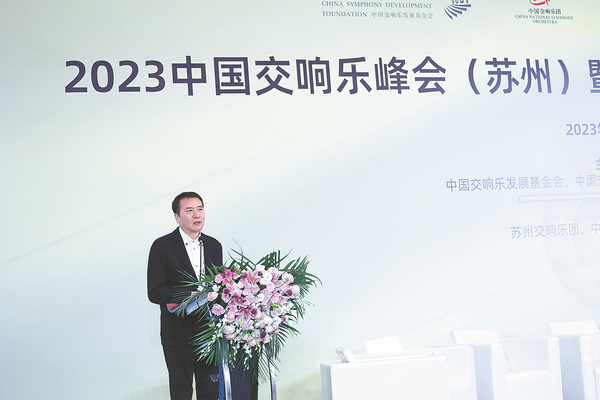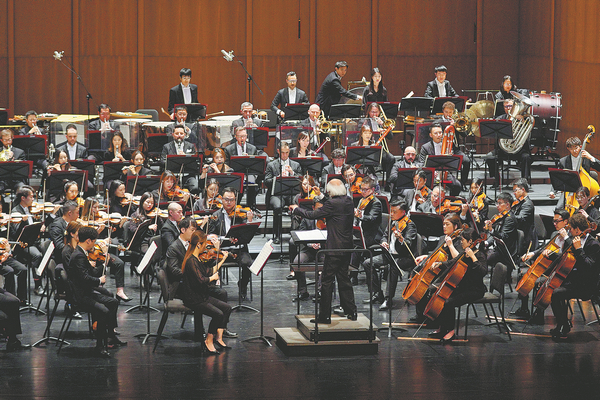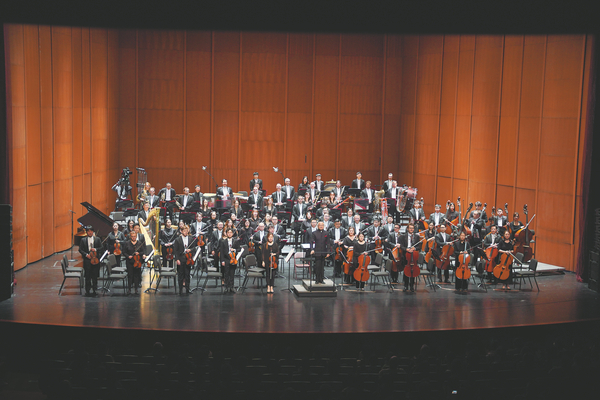

Chinese orchestras perform original works as they attract a growing audience, Chen Nan reports.
When the Suzhou Symphony Orchestra planned to mark its seventh birthday with a concert, conductor Chen Xieyang, its music director, decided to perform works by Chinese composer Zhu Jian'er (1922-2017).
On Nov 18, Chen, 84, performed Zhu's Symphony No 2, Op 28, Symphony No 1, Op 28, and Symphonic Fantasia in Memory of the Martyrs for Truth, Op 21, at the Suzhou Culture and Arts Centre.
"Of all the music works by Chinese composers, Zhu's works are among my most performed pieces," says Chen, also Shanghai Symphony Orchestra's former artistic director and conductor.
Zhu worked as the orchestra's resident composer.
At 64, he finished his first symphony. From 1985 to 1999, he composed 10 more, which enabled him to emerge as one of the nation's most prominent symphonist.
The concert also brought an end to the Eighth China Symphony Festival and the 17th China Symphony Summit, which took place in Suzhou, Jiangsu province.
Chinese symphony orchestras and Chinese composers were highlighted throughout the festival.
Co-initiated by the China Symphony Development Foundation, the two events reviewed the development of China's symphonic music and gathered directors of symphony orchestras as well as conductors, composers and music scholars.
Topics, such as promoting the composition of original Chinese music and the ongoing challenges facing symphony orchestras were discussed at the summit.
"The development of Chinese symphonic music works is closely related to the growth of Chinese symphony orchestras," says Guo Shan, the former chairman of the China Symphony Development Foundation.
"Back in 2005, when the first China Symphony Summit took place, we only had about 19 members, who were all directors of Chinese symphony orchestras. They didn't know one another and the problems they faced were varied. Something they had in common, though, was the lack of original Chinese music works to perform and financial support.
"Our goal was to make a difference to the development of symphony orchestras in China," she says.
In 2006, the summit took a dozen symphony orchestra directors to Europe to visit established orchestras.

"Since the trip to Europe, things got better. The communication among Chinese symphony orchestras became more frequent. Conductors, composers, and even musicians, have been sharing their knowledge. They started to co-commission music pieces. They have supported one another," says Guo.
Now, thanks to the support of local governments and increasing audiences, the country has nearly 100 symphony orchestras. The summit has become an annual reunion for the Chinese symphony orchestras, where they share their experiences and explore new opportunities to work together.
"Almost all the major cities in the country have their own symphony orchestra, all of which promote the development of Chinese symphonic music," says Ye Xiaogang, a renowned composer, who is also the chairman of the China Musicians Association.
Since April, the Eighth China Symphony Festival has gathered 31 symphony orchestras from around China, as well as eight traditional Chinese music orchestras, one chamber music ensemble and one student symphony orchestra, staging 42 concerts featuring Chinese works.
"We have many new works by Chinese composers commissioned by Chinese symphony orchestras every year.
"Audiences used to buy tickets to the concerts to listen to works by Beethoven, Chopin or Mozart. Now, though, they are interested in Chinese compositions," Ye adds.
According to Chen Guangxian, chairman of the China Symphony Development Foundation and director of the Suzhou Symphony Orchestra, Chinese works have become an important part of the performing seasons of many Chinese symphony orchestras.
For example, in 2021, the Suzhou Symphony Orchestra, which was founded in 2016 and gathers young musicians from 18 countries and regions across four continents, launched the Hua Xia Music Festival.

This festival performs works solely by Chinese composers. So far, the music festival has staged over 40 concerts.
"Many young Chinese composers have received their music education abroad and their approach to composing music is very updated. However, if their works are too abstract to enjoy, they fail to connect with audiences," says Chen Guangxian.
"The works we chose to perform during the music festival usually feature elements of Chinese folk music, which is welcomed by the audience. We also commission new works featuring folk music elements of Suzhou, such as Kunqu Opera and ping tan (an old art form of singing and storytelling).
"We want to bridge that gap between contemporary works and the audiences' appetite for music."
Contact the writer at chennan@chinadaily.com.cn